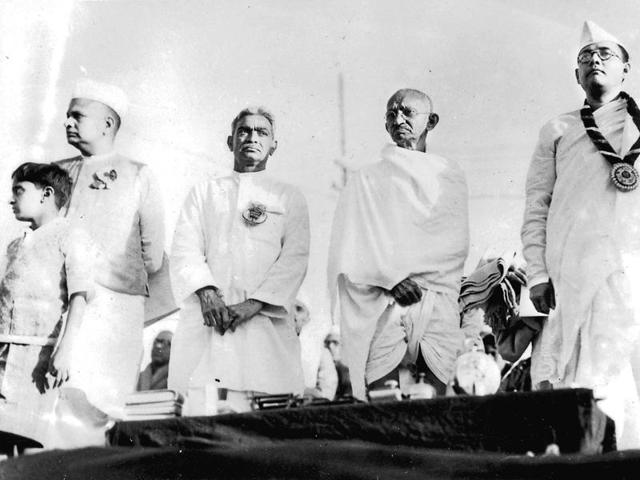Communalists claiming proximity to secular Bose is amusing
Sectarian elements staking ownership of Bose sullies his impressive commitment to inter-religious harmony, writes Ashis Ray.
Today — Subhas Bose’s 119th birth anniversary — the Union government will make public files relating to him, hitherto classified, under the Official Secrets Act. This should delight academics, not to mention Bose’s extended family and his dedicated followers who have campaigned for this disclosure. The move has also been welcomed by Bose’s only child and heir, Professor Anita Pfaff, who resides in Germany.

Those at the forefront of the campaign for declassification need to be congratulated. At the same time, it would be surprising if their expectation that such revelation will establish Bose did not perish after a plane crash in Taipei on August 18, 1945, and Jawaharlal Nehru did the dirty on him, is fulfilled.
The Bharatiya Janata Party seems eager to embrace Bose before this year’s elections in West Bengal. A drip feed of previously secret information will, it hopes, sustain speculation, which it can then exploit on hustings.
For communalists to claim proximity to Bose, who was naturally secular, is amusing. To paint him as an enemy of the Indian National Congress is a travesty of truth.
Bose returned to India from England in 1921 at the age of 24 after sensationally declining an offer to join the coveted Indian Civil Service. Notwithstanding long spells in incarceration, extended exiles outside the country, he fairly meteorically reached the summit of being unanimously elected Congress president at the age of 41.
The United States-headquartered international news magazine, TIME, put him on its cover. It reported from Haripura in Gujarat: “Among the slick, satisfied top handful of Congress politicians, most of them obviously enjoying the incense of power and prestige, Subhas Bose stands out.”
Bose was in essence a Left-wing patriot. In his presidential speech, he stressed: “Our chief national problem relating to the eradication of poverty, illiteracy and disease and to scientific production and distribution can be effectively tackled only along socialistic lines.”
Gandhians and Right-wingers in the Congress, though, were resistant to Bose and opposed his re-election as president. Indeed, Vallabhbhai Patel specifically asked Bose to step aside.
Bose replied he would not contest if a leftist stood as a candidate. This did not happen; and he defeated Pattabhi Sitaramayya by 1,580 to 1,375 votes.
Gandhi fumed: “…Since I was instrumental in inducing Dr Pattabhi not to withdraw… the defeat is more mine than his… it is plain to me that the delegates do not approve of the principles and policy for which I stand.”
In contrast, Bose was conciliatory. “It will be a tragic thing for me,” he stated, “if I succeed in winning the confidence of other people but fail to win the confidence of India’s greatest man.”
But the Mahatma ruthlessly instigated the resignation of all working committee members, other than Bose’s elder brother Sarat. Besides, a resolution passed at the All India Congress Committee (AICC) session in Tripuri in Madhya Pradesh insultingly bound Bose to selecting a working committee “in accordance with the wishes of Gandhiji”.
Bose’s attempts to reach an understanding with Gandhi were rebuffed. He, therefore, resigned. At a special meeting of the AICC in Kolkata, Nehru moved a motion to urge Bose to withdraw his resignation, suggesting re-constitution of the previous working committee, barring two members, who would be replaced in accordance with the president’s choice. But Bose stuck to his stand of a more representative committee.
In effect, a rightist plot — orchestrated by Patel, Chakravarti Rajagopalachari, Jivatram Kripalani and Rajendra Prasad and blessed by Gandhi — succeeded in dethroning a democratically elected Congress president.
Bose now formed a group within the Congress, which he called the “Forward Bloc”, to consolidate Left forces within the organisation. In retaliation, the working committee under Prasad decided “that for the grave act of indiscipline” the former president be disqualified from being a member of any elected body of the party “for three years as from August 1939”.
It was a grave error. Bose was upset with Nehru for abandoning him. They were otherwise bedfellows on socio-economic matters. Yet he did not part company with the Congress.
In January 1941, Bose dramatically escaped from India to spend the remaining four and a half years of his life in Europe and East Asia. In his radio broadcasts from abroad, he would, in fact, often make suggestions to the Congress as one who was a part of the fold.
When it came to forming his Indian National Army (INA), he named its brigades after Gandhi, Nehru and (Maulana) Azad. As the INA commenced its campaign to enter Northeast India, Bose, on February 22, 1944, took to the airwaves from Yangon on his Azad Hind Radio. “Father of the Nation,” he appealed to Gandhi, “in this holy war for India’s liberation, we ask for your blessings and good wishes.” This was the first time anyone had so conferred the overarching mantle on the Mahatma.
Gandhi later acknowledged: “The hypnotism of the Indian National Army has cast its spell on us. Netaji’s name is one to conjure with. His patriotism is second to none. His bravery shines through all his actions.”
When in 1945 the British officers of the INA were put on trial at the Red Fort, Nehru, who had earlier opposed Bose’s alliance with Japan, unhesitatingly admitted: “The INA trial has created a mass upheaval.”
In the winter of 1960-61, when Bose’s half-Austrian daughter Anita visited Delhi for the first time, she was an honoured house guest at Nehru’s prime ministerial residence.
However, while Bose generally figures among a pantheon of past leaders whose faces form a montage over Congress meets, the party hasn’t since independence been really enthusiastic about him.
At the same time, sectarian elements staking ownership of Bose sullies his impressive commitment to inter-religious harmony.
Ashis Ray is London-based journalist and creator of www.bosefiles.info. The views expressed are personal.





